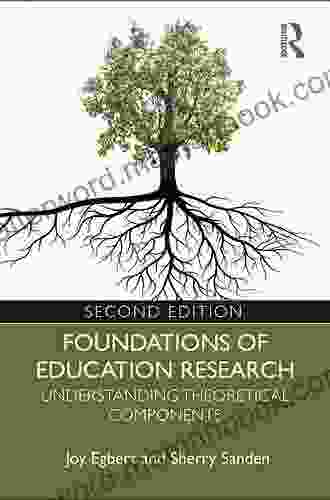Foundations of Education Research: Understanding Theoretical Components

4 out of 5
| Language | : | English |
| File size | : | 2458 KB |
| Text-to-Speech | : | Enabled |
| Enhanced typesetting | : | Enabled |
| Word Wise | : | Enabled |
| Print length | : | 180 pages |
| Screen Reader | : | Supported |
Education research plays a vital role in shaping educational practices and policies. To conduct effective research, it is essential to have a solid understanding of the theoretical components that provide the foundation for educational inquiry. This article explores the key theoretical components of education research, including research paradigms, methodologies, and methods, providing a comprehensive overview for aspiring researchers and practitioners.
1. Research Paradigms
The research paradigm serves as the overarching philosophical framework that guides the research process. It shapes the researcher's assumptions, beliefs, and values about the nature of knowledge, reality, and the purpose of research. The most prevalent research paradigms in education are:
- Positivism: Emphasizes objectivity, empiricism, and the use of quantitative methods to test hypotheses and establish causal relationships.
- Interpretivism: Focuses on understanding the subjective experiences, beliefs, and values of participants, often through qualitative methods such as interviews and observations.
- Critical Theory: Aims to critique and transform social structures and practices that perpetuate inequality and oppression, using participatory and emancipatory research methods.
- Pragmatism: Emphasizes the practical application of research findings to solve real-world problems, combining elements of both positivism and interpretivism.
2. Methodologies
Once a research paradigm has been selected, the researcher must choose an appropriate methodology to guide the research process. The methodology outlines the specific procedures and techniques used to collect and analyze data. Common methodologies in education research include:
- Quantitative Research: Employs numerical data and statistical analyses to test hypotheses and generalize findings to a larger population.
- Qualitative Research: Explores subjective experiences and meanings through in-depth interviews, observations, and document analysis.
- Mixed Methods Research: Combines elements of both quantitative and qualitative research to provide a more comprehensive understanding of the research problem.
- Action Research: Involves researchers collaborating with practitioners to conduct research that directly addresses a specific problem or need in an educational setting.
3. Methods
Within each methodology, researchers select specific methods for data collection and analysis. The choice of method depends on the research question, the research paradigm, and the methodology. Some common methods used in education research include:
- Surveys: Collect quantitative data from a large sample of participants through questionnaires.
- Interviews: Collect qualitative data through in-depth conversations with participants.
- Observations: Collect data by observing participants in natural or controlled settings.
- Document Analysis: Analyze written or visual documents to gain insights into a particular topic.
- Statistical Analysis: Use statistical techniques to analyze quantitative data and test hypotheses.
- Thematic Analysis: Identify and interpret themes and patterns in qualitative data.
- Grounded Theory: Develop theories inductively from qualitative data, allowing for the emergence of new insights.
Understanding the theoretical components of education research is paramount for conducting rigorous and impactful research. By choosing an appropriate research paradigm, methodology, and method, researchers can ensure that their research is aligned with their research question, promotes rigor, and contributes to the advancement of knowledge in the field of education.
This article has provided a comprehensive overview of the foundations of education research, exploring the key theoretical components that underpin educational inquiry. By integrating these concepts into their research practices, researchers can enhance the quality and relevance of their research, ultimately contributing to the improvement of educational practices and policies.
4 out of 5
| Language | : | English |
| File size | : | 2458 KB |
| Text-to-Speech | : | Enabled |
| Enhanced typesetting | : | Enabled |
| Word Wise | : | Enabled |
| Print length | : | 180 pages |
| Screen Reader | : | Supported |
Do you want to contribute by writing guest posts on this blog?
Please contact us and send us a resume of previous articles that you have written.
 Top Book
Top Book Novel
Novel Fiction
Fiction Nonfiction
Nonfiction Literature
Literature Paperback
Paperback Hardcover
Hardcover E-book
E-book Audiobook
Audiobook Bestseller
Bestseller Classic
Classic Mystery
Mystery Thriller
Thriller Romance
Romance Fantasy
Fantasy Science Fiction
Science Fiction Biography
Biography Memoir
Memoir Autobiography
Autobiography Poetry
Poetry Drama
Drama Historical Fiction
Historical Fiction Self-help
Self-help Young Adult
Young Adult Childrens Books
Childrens Books Graphic Novel
Graphic Novel Anthology
Anthology Series
Series Encyclopedia
Encyclopedia Reference
Reference Guidebook
Guidebook Textbook
Textbook Workbook
Workbook Journal
Journal Diary
Diary Manuscript
Manuscript Folio
Folio Pulp Fiction
Pulp Fiction Short Stories
Short Stories Fairy Tales
Fairy Tales Fables
Fables Mythology
Mythology Philosophy
Philosophy Religion
Religion Spirituality
Spirituality Essays
Essays Critique
Critique Commentary
Commentary Glossary
Glossary Bibliography
Bibliography Index
Index Table of Contents
Table of Contents Preface
Preface Introduction
Introduction Foreword
Foreword Afterword
Afterword Appendices
Appendices Annotations
Annotations Footnotes
Footnotes Epilogue
Epilogue Prologue
Prologue Sincere Noble
Sincere Noble Emilie Raffa
Emilie Raffa Steven G Medema
Steven G Medema L Q Murphy
L Q Murphy Zack Horton
Zack Horton Robert Prigo
Robert Prigo Sheila Callaghan
Sheila Callaghan Daniel David Moses
Daniel David Moses Ieva Grauslys
Ieva Grauslys Edmund Chua
Edmund Chua Jason Wallace
Jason Wallace G Keith Parker
G Keith Parker Kemberlee Shortland
Kemberlee Shortland Alexis Sears
Alexis Sears Will Duffy
Will Duffy J T Geissinger
J T Geissinger Kassia St Clair
Kassia St Clair Cute Broidery Company
Cute Broidery Company David E Navarro
David E Navarro Charles Wehrenberg
Charles Wehrenberg
Light bulbAdvertise smarter! Our strategic ad space ensures maximum exposure. Reserve your spot today!
 Gene SimmonsFollow ·10.4k
Gene SimmonsFollow ·10.4k Jackson HayesFollow ·19.2k
Jackson HayesFollow ·19.2k Brian WestFollow ·11.3k
Brian WestFollow ·11.3k Corbin PowellFollow ·10.6k
Corbin PowellFollow ·10.6k Beau CarterFollow ·16k
Beau CarterFollow ·16k Wesley ReedFollow ·9.5k
Wesley ReedFollow ·9.5k Chadwick PowellFollow ·10.1k
Chadwick PowellFollow ·10.1k Sidney CoxFollow ·14.7k
Sidney CoxFollow ·14.7k

 Bryce Foster
Bryce FosterViolin Is Easy: A Comprehensive Guide for Beginners
The violin is a...

 Cristian Cox
Cristian CoxThe True Story Of The Ivy League Cowboys Who Raided The...
In the early 2000s, a group of Ivy League...

 Ken Follett
Ken FollettUnraveling the Enchanting World of Menewood: A...
Embark on an enthralling...

 Phil Foster
Phil FosterNorth Poems by Seamus Heaney: An Exploration of Place,...
Seamus Heaney's North...

 Jack Butler
Jack ButlerFleeting Encounters: The Enigmatic Transience of Maria...
In the annals of literary history, fleeting...

 Eliot Foster
Eliot FosterA Haiku Summer: Capturing the Essence of the Season in...
Summer is a time of warmth,...
4 out of 5
| Language | : | English |
| File size | : | 2458 KB |
| Text-to-Speech | : | Enabled |
| Enhanced typesetting | : | Enabled |
| Word Wise | : | Enabled |
| Print length | : | 180 pages |
| Screen Reader | : | Supported |












